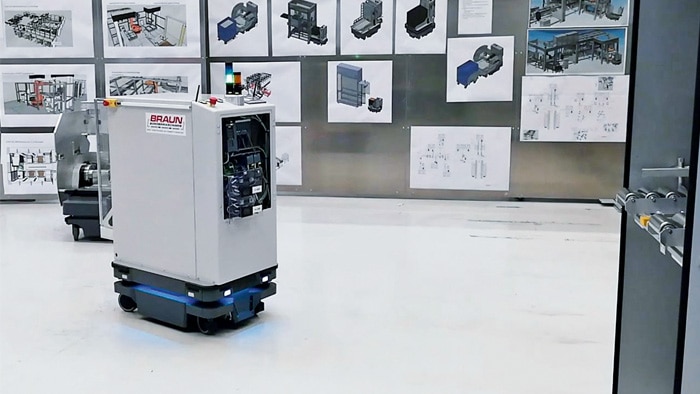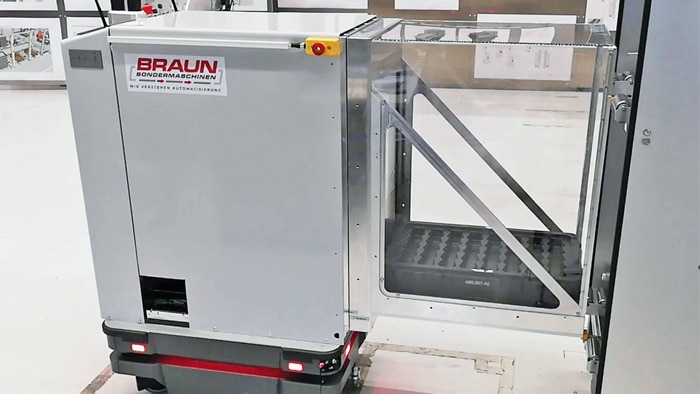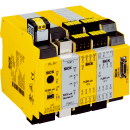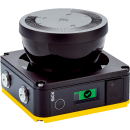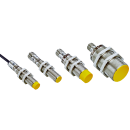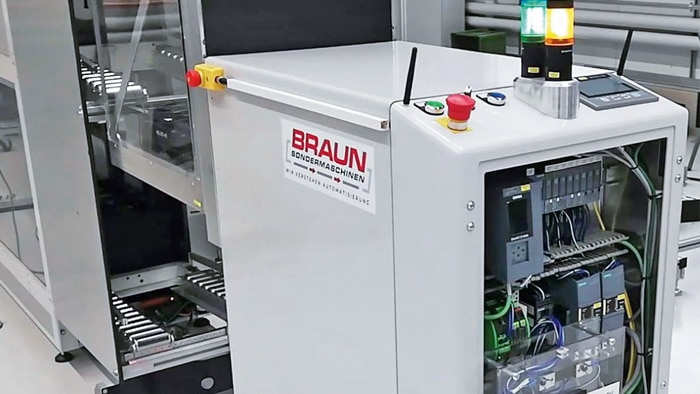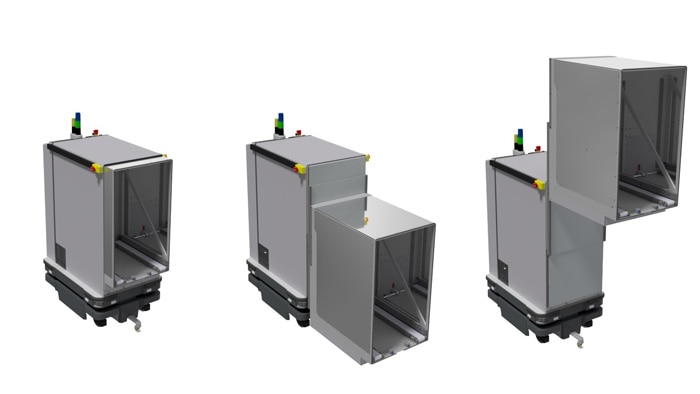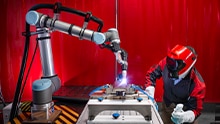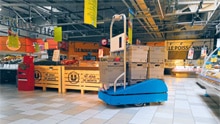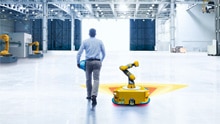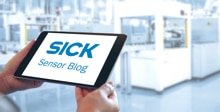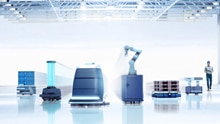Autonomous mobile robots have many applications. They are ideal for use in the logistics and transport area where many products are loaded and shipments prepared for dispatch. Loading and unloading: this is the core business of mobile robots. The company Braun Sondermaschinen GmbH has developed an autonomous mobile robot called the BS Trayshuttle that can autonomously pick up stacks of small load carriers or trays from one pallet handling machine and put them down in another pallet handling machine. More specifically, the task of the BS Trayshuttle is to determine positions, take distance measurements, and navigate reliably. Comprehensive sensor solutions from SICK have been employed to enable them to master all of these different challenges.
Ultracompact mobile robots optimize the process chain
Using the BS Trayshuttles from Braun Sondermaschinen, companies can transport loads from one location to the next along an assembly line in an automated manner. The mobile robot can pick up loads completely independently from one pallet handling machine and put them down in another. They safeguard and increase the productivity and efficiency of the entire assembly line by making the internal transport logistics as effective as possible. An inestimable advantage for companies that use the autonomous mobile robot. When selecting the sensors, Braun Sondermaschinen turned to SICK. SICK listened to the objectives and requirements of its long-standing customer and then implemented them in a tailored manner. The result was a mobile robot whose software can be programmed to precisely suit the processes on-site.
The components: complete solution from SICK
To implement the BS Trayshuttle, an autonomous mobile robot (AMR) from the company MiR was selected. These AMRs have already been successfully used in other applications. The technical setup of the BS Trayshuttle is mounted on an MiR250. The AMR is equipped with a Flexi Soft safety controller and a nanoScan3 safety laser scanner as standard. Thanks to the small and compact construction of the nanoScan3, it was possible to achieve a space-saving design for the MiR250. The two nanoScan3 devices provide allround protection to the vehicle. The Flexi Soft, which is installed as standard, ensures safe operation even when one of the up to 128 freely configurable protective fields of the laser scanner is breached, for example by an employee. Besides safe operation, this combination also offers a maximum level of flexibility for adapting the speed and direction of travel of the vehicle.
All sensors in the autonomous mobile robot come from SICK. A PowerProx WTT12L MultiTask photoelectric sensor is used for determining the position of the trays, and a W4-3 miniature photoelectric sensor for querying their end position. And the position of trays on the vehicle itself is determined by an IME2S inductive proximity sensor.
Other challenges associated with the BS Trayshuttle have also been solved using the sensor technologies from SICK. For example, a WTT12L measures distances within the vehicle in order to correctly load and unload the tray. Inductive sensors check whether the correct location has been reached.
The BS Trayshuttle in use
The BS Trayshuttle is precisely programmed for its application on-site and knows its way around. To set it in motion, all you have to do is press a green start button on the vehicle and it automatically starts to move. It leaves its station and travels to the specified target location to start loading and unloading goods. The transport system moves itself into position at a precisely defined area in front of the rack. Sensors assist with correctly determining the location. Having arrived there, the BS Trayshuttle extends its tray. This is a surface integrated into the vehicle onto which goods can be placed. How far the tray needs to be extended in order to optimally transfer the goods is also controlled by sensors. The unit itself is height-adjustable so the transfer can occur at different points. Once the exchange is complete, the tray retracts again. For a more efficient process, it is of course possible to visit multiple bays in sequence, i.e. the BS Trayshuttle first transfers a product to one bay, then moves up to the next bay to pick up a new product which it then transports to the next location. This is no problem at all thanks to the variable tray transfer height of 200 mm up to 1,200 mm. When the autonomous guided robot is no longer required, it returns to its charging station and waits for the next job.
Listen well and program precisely
To enable the autonomous mobile robot to glide about the factory at up to 7 km/h with apparent childlike ease, it is necessary to have a precise knowledge of the requirements. Particular attention needed to be placed on the safety technology. How should the vehicle respond in specific situations, and what solutions are required to achieve a smooth process?
To find this out, Braun Sondermaschinen collaborated intensively with SICK. Braun Sondermaschinenbau was able to access the same experts at SICK throughout the course of the project. This made it possible to find solutions to a wide variety of challenges on site. In the end, a mobile robot was created that is tailored to the specific requirements of Braun Sondermaschinen’s customers. The existing collaborative relationship between Braun Sondermaschinen and SICK was also strengthened as a result of this project.
Read more
Safe and fast: nanoScan3 makes Cobot welding even more efficient
Mobile robot revolutionizes work in supermarkets
The new mobility: How sensors control the cobots of the future
Robots móviles:
hacia nuevas dimensiones
La robótica se abre paso, ya sea en la producción, la logística o los servicios. Soluciones de sensores para todas las variantes de robots móviles
